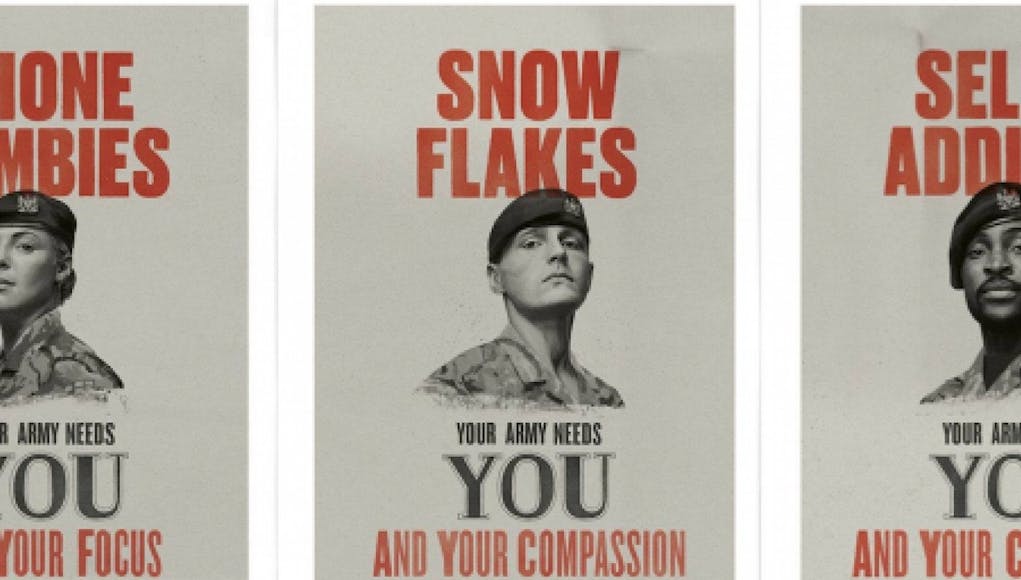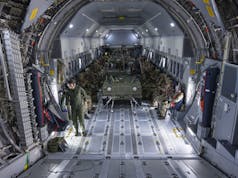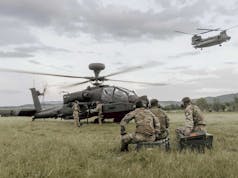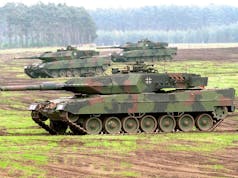The British Army is promoting posters and television adverts aimed at the younger generation in a new recruitment drive.
The poster designs hark from Lord Kitchener’s ‘Our Country Needs You’ World War One posters.
However, the refreshed prints target the younger generation of ‘Millennials’ and ‘Generation Z’, including “snowflakes”, “phone zombies” and “selfie addicts”.
The Army claims this is to undercut and dispel national stereotypes, by highlighting the strengths of young people. The Ministry of Defence (MoD) claims that 72% of young people feel undervalued in their current occupations.
The works are a part of the Army’s ‘This is Belonging’ campaign, which aims to make younger people feel more appreciated.
The Army highlights the nationally-perceived negative characteristics of young people and claims them as positives. For example, gaming addicts are seen as having high levels of confidence and self-motivation, and ‘me-me Millennials’ are seen to have high self-belief.
Aforementioned ‘phone addicts’ are praised for their focus capacity, and ‘snowflakes’ for their compassion.
Head of Army recruitment, Major General Paul Nanson, claims that the army “sees people differently and we are proud to look beyond the stereotypes”.
Why the Recruitment Drive Now?
The push comes after multiple reports from government agencies, stating that the Army is underfunded and understaffed.
A report from the Ministry of Defence, discovered that the Army is struggling for numbers. Just 12,130 people joined the UK Regular Armed forces between October 1st and September 30th, a decrease of 1.2% on the previous year. However, less people left the forces. The overall strength of the UK Forces Personnel also decreased by 1.8% in the same year.
The National Audit Office also found that the Army is understaffed in critical areas such as intelligence and engineering. The Office found that the Army had failed to meet annual recruitment targets for new soldiers and officers in every year since 2013. This was exacerbated by the fact the online recruitment system went online 52 months later than expected, a system outsourced to Capita.
Government statistics measure a total decline of 3.1% in staff. The requirement of 83,500 soldiers has not been met, with actual numbers of around 79,640.













Recruitment will be the biggest military issue going forward for many countries. Germany is currently looking across Europe for personnel. As I’ve mentioned in previous blogs, social pressure can and will possibly be another hurdle for the forces? Veganism is growing very fast, surged on by social media, and some unwanted persuasion. Exactly the same instruments could turn the minds of younger generations as to the morality of fighting wars.
People should stop judging these recruitment campaigns as soon as they came out on the basis of what they look like. At the end of the day they’re not aimed at the 40+ or so bracket so lets just wait and see what the results are like since everyone slammed last year’s campaign when it actually produced a large amount of applications which Capita and the system failed to capitalise on. Just wait and see people.
Sorry Chris, I’m in a house with two youngsters who are both quite firmly in the target bracket, both in age and aspiration.
I cannot tell you the exact words they used to describe their opinion, but it is safe to say the British Army will not be getting many applicants from this campaign.
I think the army (The military was a whole, actually) are missing a trick here by not capturing their target audience.
The majority of people who join the armed forces are young people of working class background. The people for whom university is rapidly becoming far too expensive. There are lots of teenagers growing up in poverty, in households where either people work on low wages and barely get by, or in a lot of cases growing up in households where nobody works.
Those people should be targeted; the people who live in council estates, growing up in poorer areas where they feel like there is no escape. The armed forces can provide that for them: give them training and skills to ensure that they don’t continue the cycle and get them out of it.
So something more like the made on the Royal Navy adverts?
Well I don’t mind those too much compared to some of the forces adverts you see on tv.
But I think actually sending forces to the schools in those areas would be a better bet.
When I was in year 9 at school I remember a RN sea king flying into our school field and then a presentation by the Navy and royal marines in the afternoon. I was pissed that 2 kids from each class in our year got to ride in the sea king and I wasn’t picked even though my teacher knew I wanted to join!
That was 1999 so in the grand scheme of things, not so long ago.
But I think that’s the kind of thing that’d grab a kids attention. Understandably it’s too expensive and we have too few helicopters these days to waste one on that but the forces should be going into schools, present the army, navy and RAF as viable careers, especially in poorer inner city schools, where the kids probably feel like the best they’ll get after school is a job in Tesco stacking shelves, or working in a factory or simply going on jobseekers. Show them there is a different life they could lead.
I assume the cadet forces are still running?
There were RAF and Army dets in my school in the 80’s.
Agree about using assets with schools.
Careful about using them in shopping centres though after one pensioner took offence to guns supposedly pointed and caused headlines, which was covered on here.
So possibly the liberal left will take offence at the military being in “proximity to children” I can see the screaming headlines in the Guardian now.
Pretty poor that we’re paying a Major General to be in charge of recruiting. Seems a bit unnecessary but our Forces are V top heavy compared to a lot of other countries.
“actual numbers of around 79,640”
Really?
I think not.